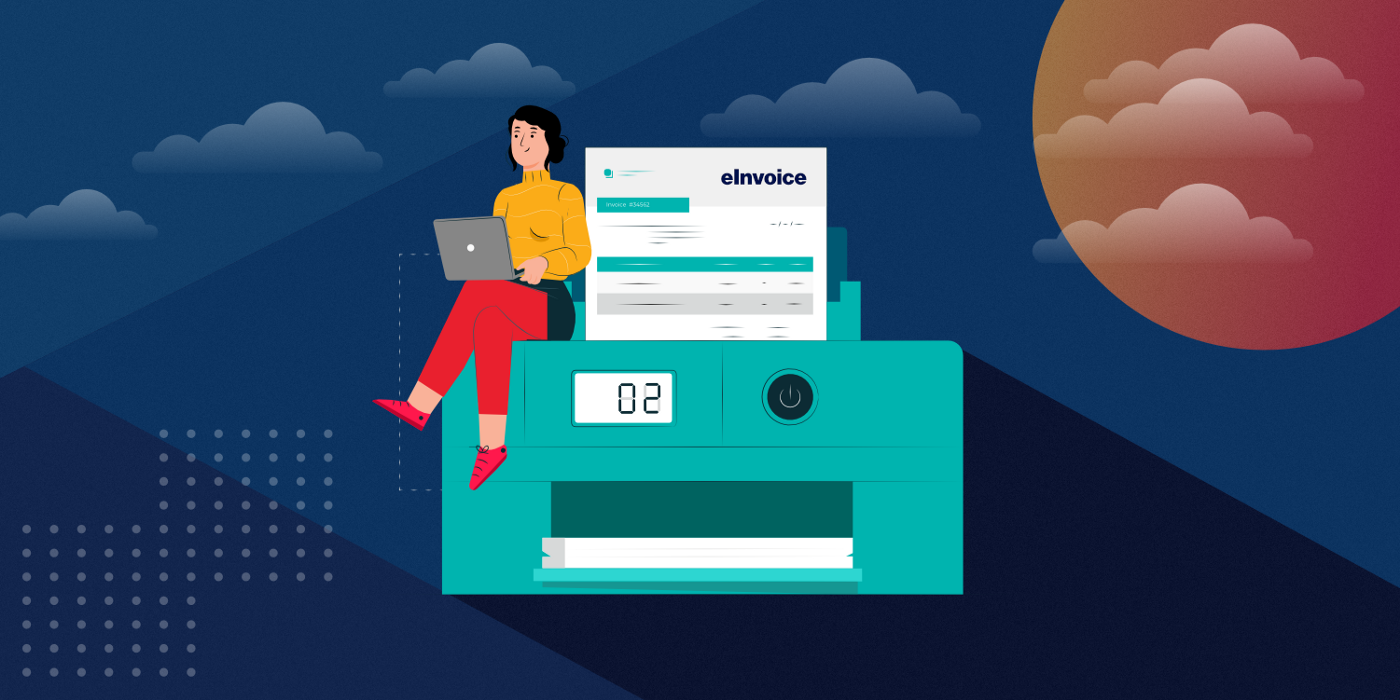“Customer is King.” The customer is the center of all that comprises the universe of businesses, trade, companies, and all.
Have you ever wondered how successful businesses keep track of every potential sales opportunity while ensuring no leads slip through the cracks? The answer lies in leveraging powerful tools like Customer Relationship Management (CRM) systems. At the heart of these systems lies a crucial feature: deals. Deals act as the central hub for organizing, tracking, and managing sales opportunities, bridging the gap between potential leads and successful closures.
In the dynamic world of sales, deals are much more than simple entries in a database. They represent every potential revenue opportunity, allowing sales teams to visualize their pipelines, prioritize tasks, and collaborate effectively. By managing deals efficiently, businesses can transform their sales process, making it more transparent and results-driven. With a robust CRM system, deals become the cornerstone of converting initial customer interest into long-term relationships.
One standout solution in this domain is Deskera ERP, which integrates deal management with a comprehensive suite of business tools. Deskera’s platform allows you to seamlessly track deals, automate tasks, and forecast revenues, ensuring your sales process is both efficient and effective.
With features like AI-driven insights and mobile accessibility, Deskera ERP empowers businesses to stay ahead in a competitive market. Whether you’re a small business or an enterprise, Deskera provides the tools to simplify and optimize your deal management.
Understanding how deals work in CRM is essential for modern businesses aiming to scale and succeed. This blog will explore the concept of deals in detail, breaking down their role in sales processes, the benefits they offer, and tips for effective management. Let’s dive in to uncover why deals are indispensable to CRM success.
What Are Deals in CRM?
In Customer Relationship Management (CRM), deals refer to opportunities or potential sales transactions that are tracked and managed through the sales pipeline. They represent the process of converting a lead or prospect into a paying customer. Each deal typically includes details such as the deal's value, the products or services involved, the customer’s information, and the current stage in the sales process.
Key Characteristics of Deals in CRM
- Pipeline Tracking: Deals move through various stages of a pipeline, such as qualification, negotiation, and closure, giving businesses a clear visual of where each opportunity stands.
- Revenue Forecasting: Deals help estimate future sales by showing potential revenue from open opportunities, which aids in financial planning and strategy.
- Collaboration and Management: They allow sales teams to collaborate, share updates, and prioritize tasks, ensuring no opportunity is missed.
- Integration with CRM Tools: Deals are often connected to other CRM features, such as email, tasks, and reporting tools, for seamless sales management.
By managing deals effectively, businesses can streamline their sales process, improve decision-making, and enhance customer relationships.
The Role of Deals in the Sales Process
Deals play a pivotal role in the sales process by serving as the foundation for tracking and managing potential revenue opportunities. They act as structured records of every interaction, task, and progress point within a sales cycle, enabling sales teams to stay organized and focused. From the moment a lead shows interest to the final closure of a sale, deals help streamline this journey while ensuring no opportunity is overlooked.
A well-managed deal serves as a roadmap for sales representatives, guiding them through defined stages like lead qualification, proposal, negotiation, and closure. This structured approach not only standardizes the sales process but also improves efficiency by helping teams prioritize high-value opportunities. For instance, deals allow sales managers to quickly identify which prospects are most likely to convert, enabling the allocation of resources where they matter most.
Moreover, deals foster better collaboration across sales teams. By centralizing all deal-related information—such as client details, communication history, and scheduled follow-ups—CRM systems ensure that everyone involved in the sales process is on the same page. This transparency reduces miscommunication and accelerates decision-making, which is particularly valuable for teams handling complex or high-stakes deals.
Lastly, deals provide critical insights into sales performance and future opportunities. By analyzing deal progress, conversion rates, and potential revenue, businesses can refine their sales strategies and forecast with greater accuracy. In this way, deals are not just tools for managing transactions; they are strategic assets that empower organizations to drive consistent growth.
Key Features of CRM Deal Management
CRM deal management systems offer a suite of features designed to simplify and optimize the sales process. These features empower businesses to track opportunities, prioritize tasks, and ensure seamless collaboration within sales teams.
Here are some of the key features:
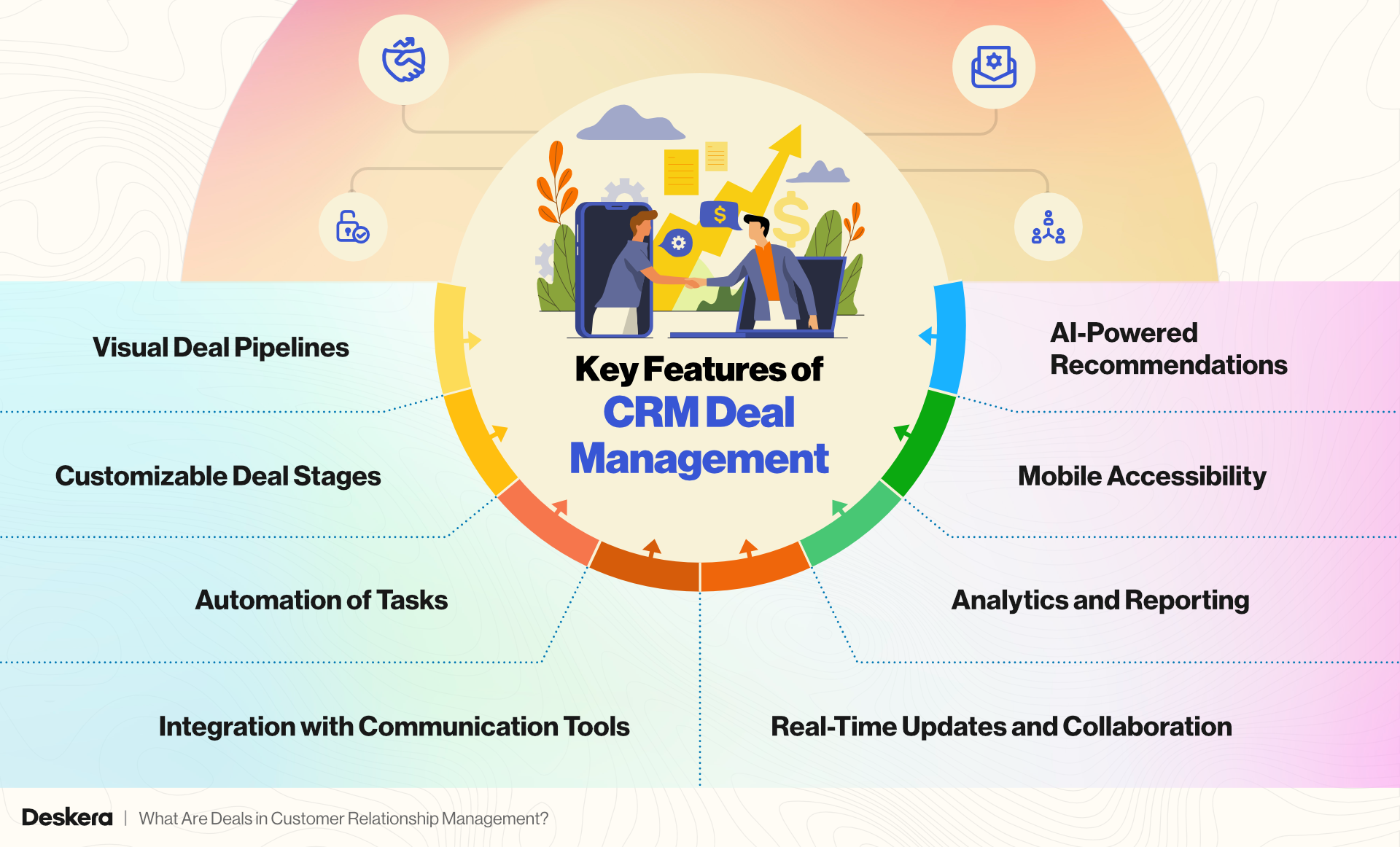
1. Visual Deal Pipelines
- CRM platforms often include visual pipelines that allow sales teams to track deals across various stages.
- These pipelines provide a clear snapshot of the sales process, helping teams identify bottlenecks and areas for improvement.
2. Customizable Deal Stages
- Businesses can tailor deal stages to align with their unique sales processes.
- Customization ensures that every deal is tracked and managed based on specific requirements, increasing efficiency.
3. Automation of Tasks
- Automating repetitive tasks like follow-ups, reminders, and updates ensures that no deal falls through the cracks.
- CRM systems can trigger notifications based on deal activity, saving time and reducing human error.
4. Integration with Communication Tools
- CRM deal management integrates with email, calls, and messaging tools, allowing sales representatives to log interactions directly under a deal.
- This integration ensures all communications are accessible in one place for better organization.
5. Real-Time Updates and Collaboration
- Sales teams can collaborate on deals in real time, ensuring smooth coordination between team members.
- Cloud-based CRMs provide instant updates, allowing access to deal information from anywhere.
6. Analytics and Reporting
- Detailed reports on deal progress, win rates, and pipeline value enable better decision-making.
- Insights derived from analytics help businesses forecast revenues and refine sales strategies.
7. Mobile Accessibility
- Many CRMs offer mobile apps, enabling sales teams to manage deals on the go.
- This feature is particularly valuable for field sales teams who need quick access to deal data during client visits.
8. AI-Powered Recommendations
- Advanced CRMs leverage artificial intelligence to provide insights such as the likelihood of deal closure or the next best action.
- These recommendations enhance decision-making and improve success rates.
By utilizing these features, businesses can transform their deal management process, ensuring a more organized, efficient, and results-driven sales operation.
Benefits of Using Deals in CRM
Deals in CRM systems offer significant advantages for businesses aiming to streamline their sales processes and improve outcomes. By providing a structured way to track and manage opportunities, deals empower sales teams to work more efficiently and effectively.
Here are the key benefits of using deals in CRM:
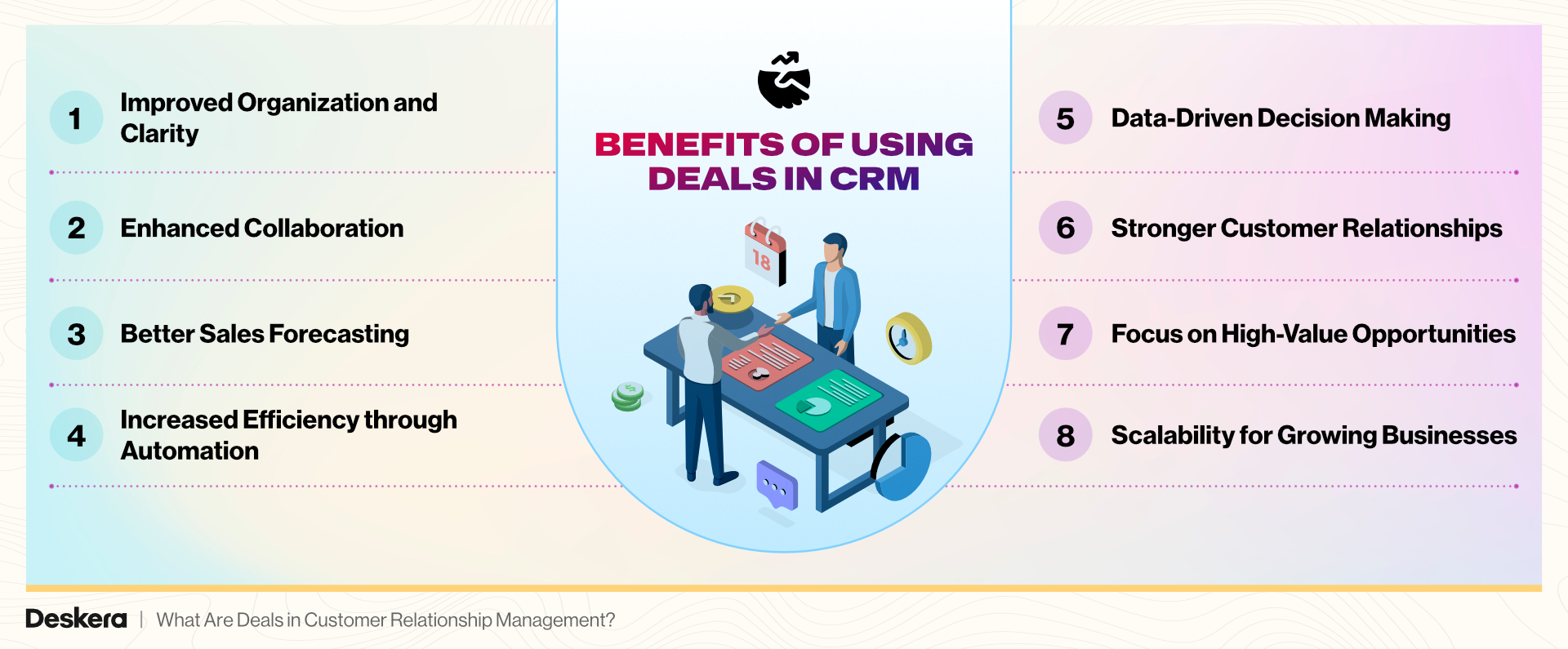
1. Improved Organization and Clarity
- Deals centralize all sales-related information, including client details, communications, and tasks.
- A clear visual pipeline ensures that teams can track the progress of each deal and prioritize their efforts accordingly.
2. Enhanced Collaboration
- By sharing deal updates and notes in real time, CRM systems foster collaboration among team members.
- Everyone involved in the sales process stays informed, reducing miscommunication and improving teamwork.
3. Better Sales Forecasting
- Deals provide valuable insights into potential revenue by tracking their value and progress.
- Accurate forecasting helps businesses plan for future growth and allocate resources effectively.
4. Increased Efficiency through Automation
- CRMs automate repetitive tasks such as follow-ups, reminders, and updates, saving time for sales representatives.
- Automation reduces human errors and ensures no opportunity is missed.
5. Data-Driven Decision Making
- Analyzing deal performance helps businesses identify trends, high-performing strategies, and areas needing improvement.
- Metrics like conversion rates and win-loss ratios provide actionable insights for refining sales strategies.
6. Stronger Customer Relationships
- With a clear view of a customer’s journey through the sales pipeline, teams can provide personalized interactions.
- This attention to detail fosters trust and builds stronger, long-lasting relationships with clients.
7. Focus on High-Value Opportunities
- By categorizing and prioritizing deals, sales teams can focus on opportunities with the highest potential for success.
- This targeted approach increases productivity and boosts revenue.
8. Scalability for Growing Businesses
- As businesses grow, CRM systems can manage larger deal volumes without compromising efficiency.
- Customizable pipelines and stages adapt to evolving business needs, ensuring continued success.
By leveraging the benefits of deals in CRM, businesses can transform their sales processes, enhance team performance, and drive sustainable growth.
How to Effectively Manage Deals in CRM?
Effectively managing deals in a CRM system is crucial for optimizing sales performance and closing opportunities efficiently. By implementing best practices and leveraging CRM features, businesses can ensure a smooth and results-driven sales process.
Here’s how to manage deals effectively in CRM:
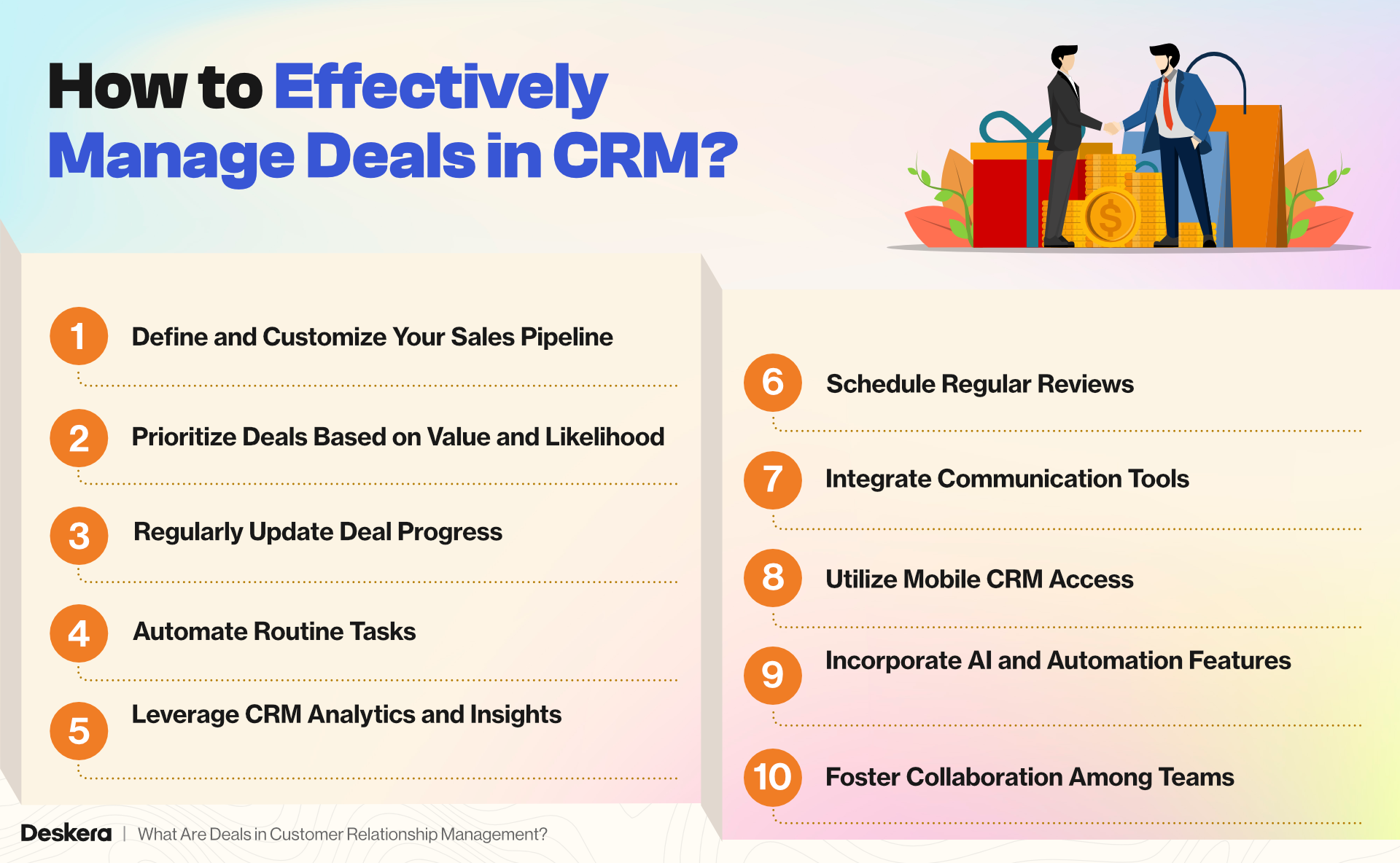
1. Define and Customize Your Sales Pipeline
- Tailor your CRM’s sales pipeline stages to reflect your unique sales process.
- Clearly define each stage, such as lead qualification, proposal, negotiation, and closure, to standardize tracking and reporting.
2. Prioritize Deals Based on Value and Likelihood
- Use CRM scoring systems to rank deals by their potential revenue and conversion probability.
- Focus on high-value deals that are most likely to close, ensuring efficient use of resources.
3. Regularly Update Deal Progress
- Keep deal records up-to-date by logging interactions, adding notes, and adjusting deal stages in real time.
- Consistent updates ensure accuracy and enable better collaboration among team members.
4. Automate Routine Tasks
- Automate follow-ups, reminders, and data entry to save time and reduce human errors.
- Use automation tools in the CRM to trigger alerts for deals requiring immediate attention.
5. Leverage CRM Analytics and Insights
- Monitor deal performance metrics such as conversion rates, average deal value, and sales cycle length.
- Use these insights to identify bottlenecks, refine strategies, and improve forecasting accuracy.
6. Schedule Regular Reviews
- Conduct periodic deal reviews with the sales team to assess pipeline health and identify risks.
- Discuss strategies for progressing stalled deals or improving win rates in team meetings.
7. Integrate Communication Tools
- Link email, calls, and messaging platforms with your CRM to centralize communication for each deal.
- This integration ensures no interaction is overlooked and enhances the customer experience.
8. Utilize Mobile CRM Access
- Enable mobile access to your CRM so that sales representatives can update deals and access data on the go.
- Mobile accessibility ensures continuous productivity, even outside the office.
9. Incorporate AI and Automation Features
- Use AI-powered tools within the CRM to receive recommendations on the next best action or to predict deal outcomes.
- Automation can also help identify patterns that indicate the likelihood of deal closure.
10. Foster Collaboration Among Teams
- Encourage cross-team collaboration by sharing deal-related information with marketing and support teams.
- A unified approach helps ensure that all customer interactions align with sales goals.
By implementing these strategies, businesses can maximize the potential of their CRM systems, improve deal closure rates, and enhance overall sales performance.
Best Practices for Using Deals in the Customer Relationship Management Process
To effectively manage deals in CRM, it’s crucial to implement best practices that streamline the process, optimize sales team efforts, and improve conversion rates. The following best practices will help you make the most of your CRM system, ensuring each deal is tracked efficiently and opportunities are maximized.
1. Assign Values to Deals
- Assigning values like expected revenue, volume, or cost to each deal allows for more accurate forecasting and better resource allocation.
- By associating these values with the actual cost of a product, you can predict and visualize revenue potential, focusing on high-value deals in the pipeline.
- This also allows teams to act on the most valuable deals, ensuring attention is directed toward opportunities that have the highest likelihood of success.
2. Automate Deal Creation
- Automating deal creation helps streamline the process by tracking every contact that enters the pipeline and automatically converting them into a deal.
- While manual deal creation may work for a small-scale operation, automating it saves valuable time, reduces errors, and keeps the pipeline moving smoothly, especially as the sales volume increases.
- CRM tools like Deskera allow for easy automation, ensuring deals are created and tracked accurately without manual intervention.
3. Score and Rank Deals
- Deal scoring helps prioritize opportunities by evaluating each based on factors like behavior, engagement, and likelihood of closure.
- Scoring deals provides insights into which deals are most probable to close successfully, allowing sales teams to focus their efforts on the highest-priority opportunities.
- CRM systems like Deskera use deal scoring to predict and visualize the probability of winning each deal, improving decision-making and resource allocation.
4. Filter Deals for Clear Organization
- Filtering deals by status (e.g., won, lost, or open) and other criteria like contact tags or team ownership ensures a well-organized pipeline.
- Advanced filtering options such as deal scores or next actions/tasks allow for a granular view of the pipeline, enabling sales teams to stay focused on deals that require immediate attention or are most likely to succeed.
- This filtering also allows for tracking the most frequent stages where deals are lost or won, helping teams refine their strategies for future deals.
5. Avoid Creating ‘Lost’ and ‘Won’ Stages
- Creating separate “lost” or “won” stages in the pipeline is often unnecessary since deals typically do not move once they are in these stages.
- Instead, filtering deals by their status can provide valuable insights into where deals are most frequently lost or won, helping teams make better decisions on which leads to pursue based on historical data.
6. Collaborate and Share Insights Across Teams
- Foster collaboration across sales, marketing, and customer support teams by sharing deal insights and updates in real time.
- A CRM system like Deskera makes it easy to share data, track progress, and ensure that all teams are aligned and working toward the same goals.
7. Use CRM Analytics for Continuous Improvement
- Regularly analyze deal performance using CRM analytics to track KPIs such as conversion rates, sales cycle length, and pipeline health.
- This data helps refine sales strategies, adjust priorities, and improve team performance over time.
8. Train Your Sales Team
- Ensure your sales team is trained in CRM best practices, including how to update deal stages, enter valuable data, and leverage CRM tools to their fullest potential.
- A well-trained team can make better use of CRM features, leading to more efficient deal management and increased closure rates.
9. Leverage CRM Software like Deskera for Seamless Deal Management
- Deskera provides an organized, seamless, and user-friendly platform that enables sales and marketing teams to close deals faster and more efficiently.
- With features like deal automation, customizable pipelines, deal scoring, and real-time collaboration, Deskera helps businesses optimize their deal management process.
By implementing these best practices, businesses can improve the efficiency of their deal management process, resulting in higher conversion rates, more streamlined workflows, and better decision-making. CRM systems like Deskera enable teams to focus on what matters most—closing deals and growing the business.
How Deskera ERP Can Help You with Deals in CRM
Deskera ERP stands out as a powerful solution for businesses looking to streamline deal management in CRM. By integrating advanced features with an intuitive interface, Deskera simplifies the sales process, enhances team productivity, and boosts deal closure rates.
Here’s how Deskera ERP can help with deals in CRM:
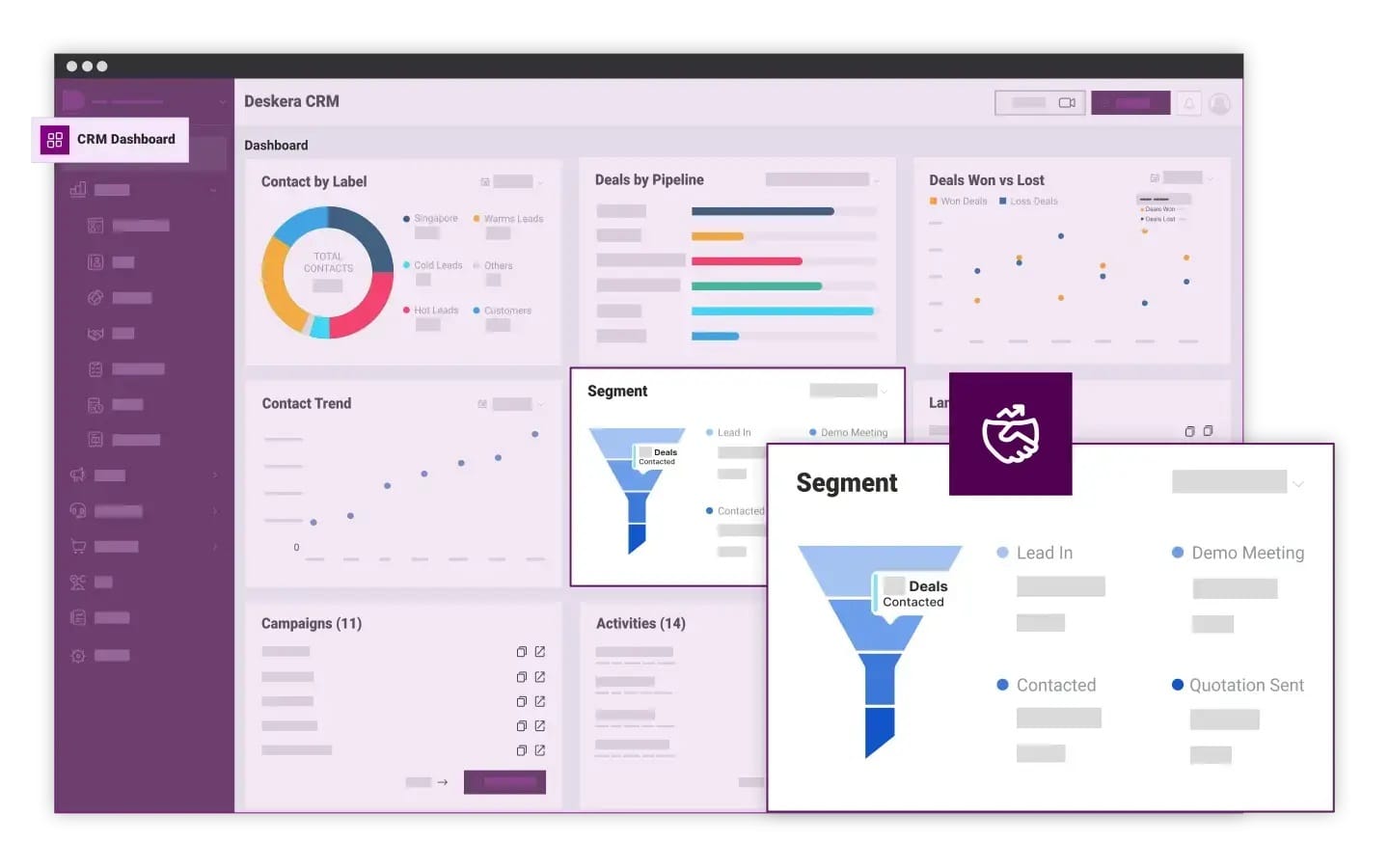
1. Comprehensive Deal Tracking
Deskera ERP allows businesses to track deals across every stage of the sales pipeline, from lead generation to closure. With a visual dashboard, sales teams can easily monitor deal progress, identify bottlenecks, and focus on high-priority opportunities.
2. Automated Workflows
Automation in Deskera ERP eliminates repetitive tasks like sending follow-ups or setting reminders. Sales teams can focus on nurturing relationships while the system handles task scheduling and notifications, ensuring no deal slips through the cracks.
3. Seamless Integration with Communication Tools
Deskera ERP integrates seamlessly with emails, calls, and messaging platforms, centralizing all deal-related communications. This integration ensures that all customer interactions are logged under the relevant deal, enabling a cohesive sales strategy.
4. Real-Time Insights and Analytics
With Deskera, businesses can access real-time analytics on deal performance, revenue forecasts, and conversion rates. These insights enable data-driven decision-making, helping businesses refine their sales strategies and achieve better outcomes.
5. Mobile Accessibility
Deskera ERP’s mobile app empowers sales teams to manage deals on the go. Whether updating deal statuses, logging customer interactions, or accessing client details, the mobile-friendly interface ensures productivity anytime, anywhere.
6. AI-Powered Sales Assistance
Deskera’s AI-driven assistant, David, offers intelligent recommendations, such as identifying the next best action for a deal or predicting the likelihood of closure. This feature helps sales teams make informed decisions and improve success rates.
7. Customizable Sales Pipelines
The platform allows businesses to tailor deal stages to match their specific sales processes. Whether you operate in B2B or B2C industries, Deskera ERP adapts to your unique workflows, ensuring a personalized and efficient sales journey.
8. Enhanced Collaboration
Deskera fosters teamwork by enabling real-time updates and collaboration on deals. Team members can share notes, assign tasks, and stay aligned, ensuring smooth deal progression.
By leveraging Deskera ERP’s robust deal management features, businesses can streamline their sales processes, improve pipeline visibility, and ultimately drive revenue growth. Whether you're a small business or a large enterprise, Deskera ERP is an invaluable tool for optimizing deal management in CRM.
Key Takeaways
- Deals in CRM represent potential revenue opportunities, providing a structured way to track and manage leads through the sales pipeline.
- Deals act as the backbone of the sales process, ensuring every opportunity is tracked from lead generation to closure. They enhance collaboration, streamline workflows, and enable data-driven decision-making to improve conversion rates.
- Effective CRM systems include features like visual pipelines, customizable deal stages, task automation, and AI-powered recommendations. These features enable sales teams to prioritize high-value deals, reduce manual errors, and stay organized.
- Managing deals in CRM improves organization, enhances team collaboration, and provides valuable insights for better sales forecasting. It also fosters stronger customer relationships, focuses resources on high-priority deals, and scales seamlessly with business growth.
- To manage deals effectively, businesses should customize pipelines, prioritize opportunities, leverage automation, and regularly update deal progress. Integration with communication tools, real-time collaboration, and AI-driven insights further enhance deal management efficiency.
- Implementing best practices such as assigning values to deals, automating deal creation, scoring and prioritizing opportunities, and organizing deals with effective filters ensures a streamlined, efficient sales process. By leveraging CRM features like those offered by Deskera, sales teams can stay focused on high-priority opportunities, collaborate seamlessly across departments, and continuously refine their strategies, leading to improved deal closure rates and overall business growth.
- By leveraging Deskera ERP’s robust deal management features, businesses can streamline their sales processes, improve pipeline visibility, and ultimately drive revenue growth. Whether you're a small business or a large enterprise, Deskera ERP is an invaluable tool for optimizing deal management in CRM.
Related Articles


